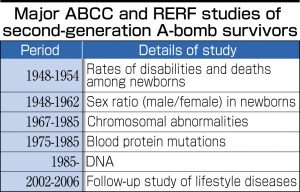RERF to hold public forum in Hiroshima on April 13 related to genome analysis in second-generation A-bomb survivors
Apr. 6, 2024
by Kaoru Ota, Staff Writer
The Radiation Effects Research Foundation (RERF), located in Hiroshima’s Minami Ward, is scheduled to hold public forums in Hiroshima and Nagasaki this month. The theme of the events involves the organization’s plans to perform genome (entirety of genetic information) analysis in second-generation A-bomb survivors. Through the forums, the institute hopes to promote better understanding of the planned research, including understanding of its potential to impact society, before it begins the analysis into genetic effects from A-bomb radiation.
The public forum in Hiroshima is scheduled to be held on April 13, starting at 2:00 p.m., at the Hiroshima Peace Memorial Museum, located in the city’s Naka Ward. The public forum in Nagasaki session is scheduled for April 20. Scientists from RERF will explain their research related to the genome analysis of about 500 families of A-bomb survivors and their children in Hiroshima and Nagasaki. The event will also include a panel discussion with A-bomb survivors and second-generation A-bomb survivors, followed by a question-and-answer session.
The effects of parental exposure to radiation from the atomic bombings on the health of the children have been studied by the institute since the time of its predecessor organization, the Atomic Bomb Casualty Commission (ABCC). No genetic effects have been confirmed through any of the statistical research conducted to date, including from studies into rates of mortality after childbirth or disease incidence.
RERF aims to further clarify the reality of the health effects from radiation by analyzing the genome, regarded as the ultimate in personal information, for the first time. At the same time, some of the second-generation survivors not only have anxiety about their health but also have experienced discrimination in marriage and employment. RERF will provide information on its research plans in advance of the study in the two A-bombed cities given the magnitude of the potential impact of the research findings.
The Hiroshima forum will be limited to 200 people (on a first-come, first-served basis). To attend, an application form must be submitted by April 8. For further information, call RERF at 082-261-3131.
Could research yield certain conclusions on existence of effects?
by Kaoru Ota, Staff Writer
The Radiation Effects Research Foundation (RERF), jointly managed by the U.S. and Japanese governments, is embarking on its first analysis of the genomes of second-generation A-bomb survivors. The following Q&A information describes details of the research and its possible effects.
Q: What kind of research will it be?
A: RERF will analyze the genomes of around 1,500 A-bomb survivors and second-generation A-bomb survivors representing about 500 families in Hiroshima and Nagasaki. Genetic mutations will be compared between a group with parents exposed to high doses of radiation and another with parents exposed to low doses. Typically, genes exhibit a certain number of changes when inherited from parents. Such changes are called “mutations.” In this study, RERF will examine genome sequences to investigate whether the mutations were caused by A-bomb radiation.
Q: How does this research differ from previous efforts?
A: RERF has been studying the genetic effects of A-bomb radiation for many years. However, the organization has mainly focused on the follow-up of groups of survivors to find cause-and-effect relationships between parental exposure and mortality and disease incidence in second-generation survivors. Advances in science have made genome analysis possible, which might help in drawing certain conclusions as to whether there are effects in the second generation.
Q: When will the research begin?
A: RERF hopes to begin full-scale research as soon as it has gained public understanding through its efforts to explain the study. The work is scheduled to take seven years, and analysis of the results will also take time. Because the A-bomb survivors continue to age, there is not a whole lot of time left. The results will be compiled into a paper and utilized in research to protect people from the deleterious effects of radiation.
Q: Why are the public forums being held?
A. Because this is a very sensitive issue for the A-bombed cities. Past studies have not confirmed any genetic effects, but due to limitations in the methods used in those studies, it cannot be said that there are no effects at all. There is a possibility that the results of this study might affect decisions made with regard to relief and compensation, and if the results are not accurately communicated to the public, they could lead to prejudice and discrimination against second-generation survivors.
Q: This seems like important research.
A: Whenever their children were in poor health, many A-bomb survivors would worry that their children’s health might have been affected by the atomic bombings. RERF believes its most important work is to build relationships of trust with A-bomb survivors and second-generation A-bomb survivors.
(Originally published on April 6, 2024)
The Radiation Effects Research Foundation (RERF), located in Hiroshima’s Minami Ward, is scheduled to hold public forums in Hiroshima and Nagasaki this month. The theme of the events involves the organization’s plans to perform genome (entirety of genetic information) analysis in second-generation A-bomb survivors. Through the forums, the institute hopes to promote better understanding of the planned research, including understanding of its potential to impact society, before it begins the analysis into genetic effects from A-bomb radiation.
The public forum in Hiroshima is scheduled to be held on April 13, starting at 2:00 p.m., at the Hiroshima Peace Memorial Museum, located in the city’s Naka Ward. The public forum in Nagasaki session is scheduled for April 20. Scientists from RERF will explain their research related to the genome analysis of about 500 families of A-bomb survivors and their children in Hiroshima and Nagasaki. The event will also include a panel discussion with A-bomb survivors and second-generation A-bomb survivors, followed by a question-and-answer session.
The effects of parental exposure to radiation from the atomic bombings on the health of the children have been studied by the institute since the time of its predecessor organization, the Atomic Bomb Casualty Commission (ABCC). No genetic effects have been confirmed through any of the statistical research conducted to date, including from studies into rates of mortality after childbirth or disease incidence.
RERF aims to further clarify the reality of the health effects from radiation by analyzing the genome, regarded as the ultimate in personal information, for the first time. At the same time, some of the second-generation survivors not only have anxiety about their health but also have experienced discrimination in marriage and employment. RERF will provide information on its research plans in advance of the study in the two A-bombed cities given the magnitude of the potential impact of the research findings.
The Hiroshima forum will be limited to 200 people (on a first-come, first-served basis). To attend, an application form must be submitted by April 8. For further information, call RERF at 082-261-3131.
Basic knowledge regarding genome analysis of second-generation A-bomb survivors
Comparison between parental radiation dose and mutations
Could research yield certain conclusions on existence of effects?
by Kaoru Ota, Staff Writer
The Radiation Effects Research Foundation (RERF), jointly managed by the U.S. and Japanese governments, is embarking on its first analysis of the genomes of second-generation A-bomb survivors. The following Q&A information describes details of the research and its possible effects.
Q: What kind of research will it be?
A: RERF will analyze the genomes of around 1,500 A-bomb survivors and second-generation A-bomb survivors representing about 500 families in Hiroshima and Nagasaki. Genetic mutations will be compared between a group with parents exposed to high doses of radiation and another with parents exposed to low doses. Typically, genes exhibit a certain number of changes when inherited from parents. Such changes are called “mutations.” In this study, RERF will examine genome sequences to investigate whether the mutations were caused by A-bomb radiation.
Q: How does this research differ from previous efforts?
A: RERF has been studying the genetic effects of A-bomb radiation for many years. However, the organization has mainly focused on the follow-up of groups of survivors to find cause-and-effect relationships between parental exposure and mortality and disease incidence in second-generation survivors. Advances in science have made genome analysis possible, which might help in drawing certain conclusions as to whether there are effects in the second generation.
Q: When will the research begin?
A: RERF hopes to begin full-scale research as soon as it has gained public understanding through its efforts to explain the study. The work is scheduled to take seven years, and analysis of the results will also take time. Because the A-bomb survivors continue to age, there is not a whole lot of time left. The results will be compiled into a paper and utilized in research to protect people from the deleterious effects of radiation.
Q: Why are the public forums being held?
A. Because this is a very sensitive issue for the A-bombed cities. Past studies have not confirmed any genetic effects, but due to limitations in the methods used in those studies, it cannot be said that there are no effects at all. There is a possibility that the results of this study might affect decisions made with regard to relief and compensation, and if the results are not accurately communicated to the public, they could lead to prejudice and discrimination against second-generation survivors.
Q: This seems like important research.
A: Whenever their children were in poor health, many A-bomb survivors would worry that their children’s health might have been affected by the atomic bombings. RERF believes its most important work is to build relationships of trust with A-bomb survivors and second-generation A-bomb survivors.
(Originally published on April 6, 2024)









